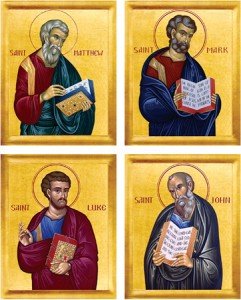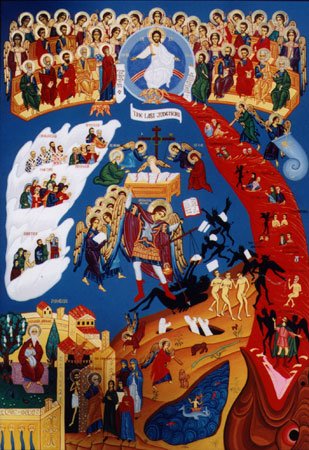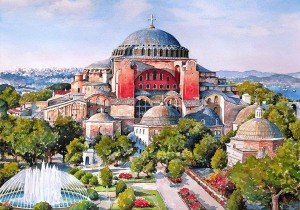GREAT FAST PASTORAL OF THE UKRAINIAN CATHOLIC HIERARCHY OF THE U.S.A. TO OUR CLERGY, HIEROMONKS AND BROTHERS, RELIGIOUS SISTERS, SEMINARIANS AND BELOVED FAITHFUL
“Be merciful just as your Father is merciful.” (Luke 6:36)
There is a story of a mother who was pleading with Napoleon Bonaparte for mercy on the life of her son, an army officer, who had been sentenced to death for treason. The emperor called the young officer’s crime an unforgivable betrayal of the nation, which it undoubtedly was, and that justice demanded his life.
“Not justice!” cried the mother, “Give him mercy!”
“He does not deserve mercy”, was Napoleon’s curt retort.
“But”, said the mother, “if he deserved it, it would not be mercy!” This mother’s wise reply immediately softened the heart of Napoleon who spared her son from the sentence of death.
As we know, this year our Lenten journey is taking place during the Extraordinary Jubilee Year of Mercy, inaugurated by His Holiness Pope Francis last December in St. Peter’s Basilica in Rome.
We are called to be merciful as our heavenly Father is merciful. But before we are able show mercy to anyone else, we are called first to open our own hearts so that we can accept the gift of mercy freely given to us by the Father. This sounds easy enough in theory, but opening our hearts to God is, at times, not as straightforward as we may think. Because in order to accept this gift of mercy, we must first admit to ourselves and to God that we, abject and sinful human creatures, are indeed, in dire need of his mercy. We are called to acquire an attitude of sincere penitence and humility, which is not always easy for us who have grown up on a diet, served up by our modern society, of pride, entitlement, and self-sufficiency.
This is why the Church, in her great wisdom, has given us the great spiritual gift of this holy season of Great Lent. The unique and evocative prayers and services of Great Lent are such that they instill in us, firstly, a recognition of our own faults and failings and secondly, a desire for personal conversion and a return to the loving arms of God the Father and his mercy. And so, over and over again in the divine services we pray: “Lord, have mercy.”
One of the saints of the Byzantine church writes the following: “This expression – Lord, have mercy – is appropriate, since we should not ask for anything except for mercy. As sinners we cannot, nor dare not, say anything to our Loving Master except have mercy.”
Our limited human intellect cannot, of course, even partially grasp the depth and breadth of the mercy of God for us. The word mercy in English is the translation of the Greek word eleos, which has the same root as the old Greek word for olive oil, a substance which was used in the ancient world as a soothing agent for bruises and minor wounds. The oil was poured onto the wound and gently massaged in, thus soothing, comforting and making whole the injured part. This should immediately bring to mind of course, the gospel parable of the Good Samaritan and the traveler who poured olive oil on the wounds of the man lying beaten and left for dead at the side of the road. (Luke 10:29-37)
So when we pray “Lord, have mercy”, we are praying in effect: “Lord, soothe me, comfort me, take away my pain, show me your steadfast love.” This mercy refers to the infinite loving kindness of God, his compassion for us his suffering children, his desire to lift us up from our pain and sorrow and sinfulness. It is in this profound sense that we pray “Lord, have mercy” with such great frequency and fervor throughout the divine services.
If we are called to embrace the mercy of God with open arms and hearts for ourselves, then how much more are we called to share this gift with others and to witness to this gift in the world? Like the traveler in the gospel parable we too are called to be a good Samaritan to those in our lives whom we meet, even accidently, in our daily lives, who have need of the soothing balm of God’s mercy to be rubbed into their wounds of body and soul, whether or not these wounds come from outside themselves or are self-inflicted.
Jesus never compromised on his ideals, but he did beautifully describe and embody God’s unconditional love, mercy and forgiveness for everyone: a beggar with leprosy, a Samaritan woman with five failed marriages, a traitor like Peter, a self-righteous human rights abuser like Saul of Tarsus, a prodigal son, an adulteress. The Gospel gives eloquent witness to this on many occasions. If Jesus showed a way of keeping the highest standards, while at the same time offering Living Water – love, forgiveness, mercy, to the least deserving of it, can we then, act any differently?
St. Isaac, the Syrian once said, “Never say that God is just. If he were just, you would be in hell. Rely only on his injustice, which is forgiveness, love and mercy”.
Our prayer today is that the Father’s gifts of forgiveness, love and mercy may brighten the path of our Lenten journey upon which we are now embarking and lead us spiritually renewed and refreshed to the Feast of Our Lord’s Resurrection!
+Stefan Soroka
Archbishop of Philadelphia for Ukrainians
Metropolitan of Ukrainian Catholics in the United States
+Richard Seminack
Eparch of St. Nicholas in Chicago
+Paul Chomnycky, OSBM (author)
Eparch of Stamford
+ Bohdan Danylo
Eparch of St. Josaphat in Parma
+John Bura
Auxiliary Bishop of Philadelphia
Great Fast, 2016
 I have already shared something about the similarities that exist within the three Synoptic Gospels. I would now like to share something about the dissimilarities.
I have already shared something about the similarities that exist within the three Synoptic Gospels. I would now like to share something about the dissimilarities.




